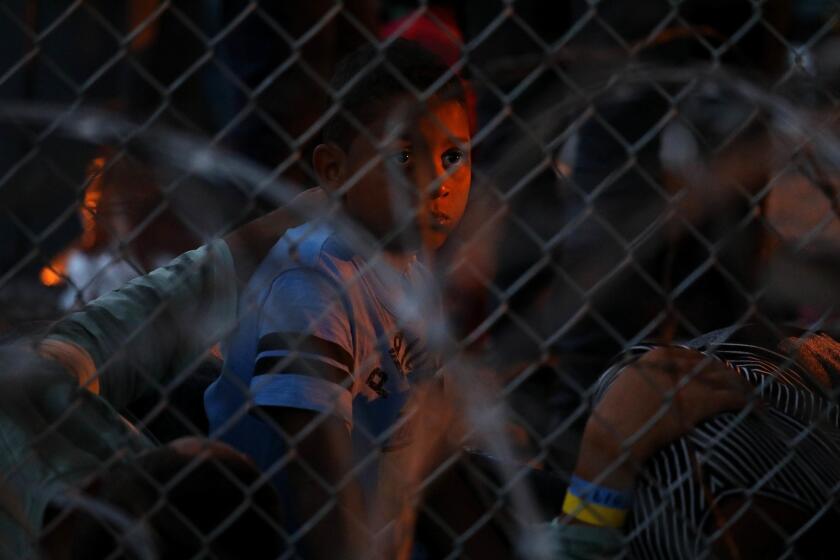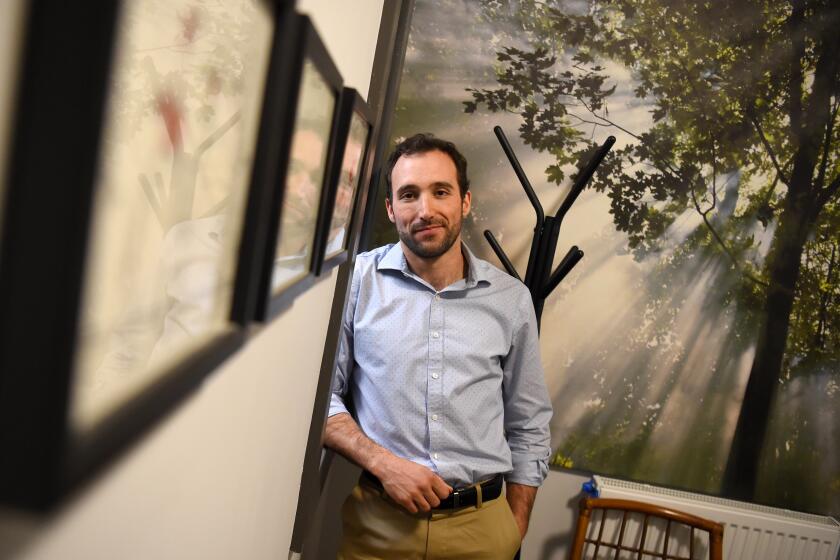Family separation returns under cover of the coronavirus
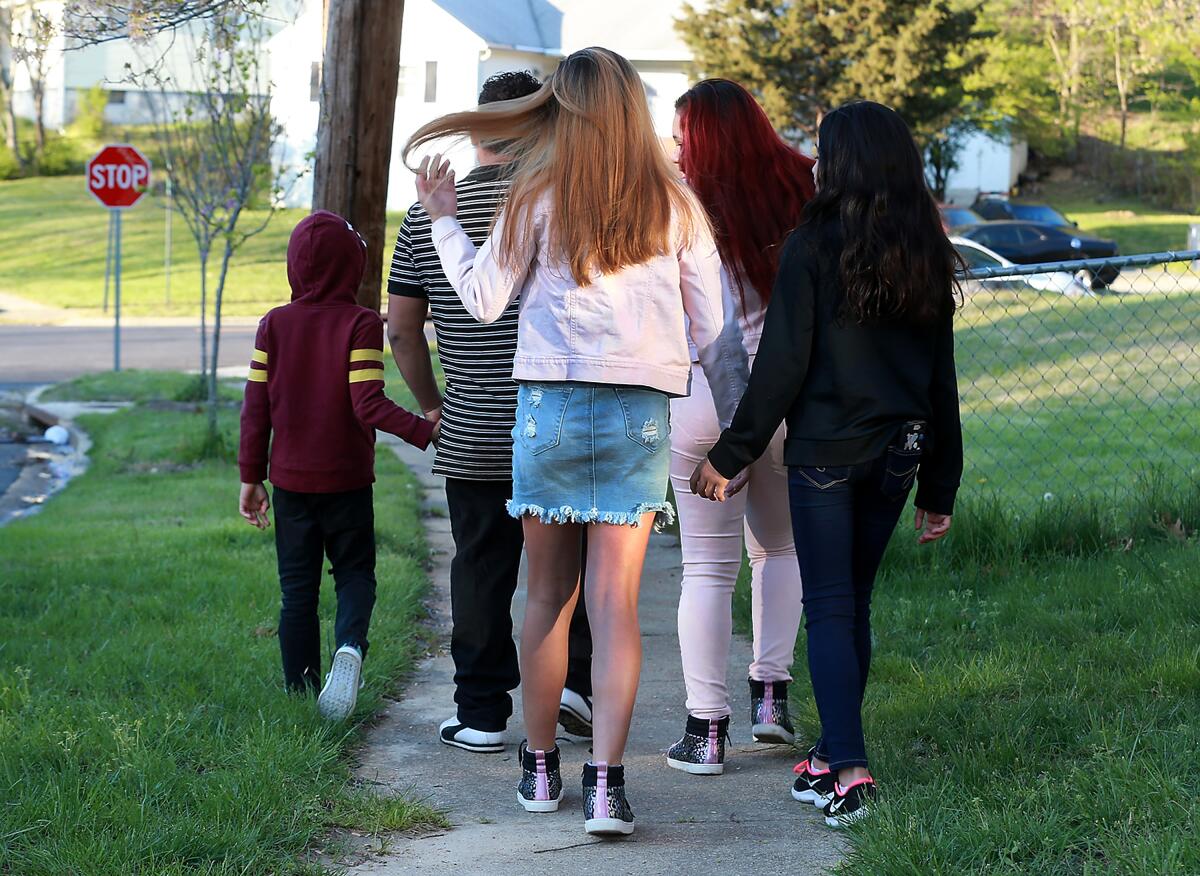
- Share via
WASHINGTON — Dad lives about 10 miles from the White House, stringing together gardening jobs, not letting the kids touch him when he gets home for fear of contagion.
Mom lives in a makeshift refugee camp on the border in Matamoros, Mexico, one of the world’s most dangerous cities, rationing soap.
Three of the children — ages 10, 14, and 16 — just joined their father, Jose, after winning release from a government shelter where they had been held for more than two months. Now, they have deportation orders hanging over their heads.
U.S. officials are fighting in court to take the three children and deport them to El Salvador — to no one. The only way to avoid being separated from their parents, officials say, would be for their mother in Mexico to give up, too. Government lawyers said they’d put her on a plane with the kids if she agreed to return to El Salvador and never again try to join her husband in the U.S.
This is the new family separation, two years after taking kids from their parents at the border blew up into a crisis for the Trump administration. Citing the coronavirus to seal the border to an unprecedented extent, the administration is engaged in a pressure campaign against immigrant parents to get them to give up either their kids or their legal claims to protection in the U.S.
Scores of migrant families across the country are being targeted, according to court documents and more than 20 officials, judges, lawyers and migrants. Many spoke on condition of anonymity for fear of jeopardizing their legal cases.
The fates of many of them may hinge on Jose’s family’s case, which has become a test of the administration’s latest policies to bar migrant kids and families, said Claudia Cubas, the litigation director for the Capital Area Immigrants’ Rights Coalition, and Jose’s lawyer.
With Jose’s family’s case the furthest along in the courts, “this is either going to make it or break it for people,” she said.
The administration refuses to release migrant kids to ready sponsors, telling courts that custody is safer — even as it ramps up deportation efforts.
Administration officials deny that they are deliberately trying to separate families.
“Consistent with President Trump’s June 20, 2018, executive order, it is the policy of the administration to maintain family unity,” Immigration and Customs Enforcement said in a statement.
The statement came after ICE officials this month presented the roughly 180 parents in its custody with the choice of separating from their children or remaining indefinitely detained with them, according to government filings in court and legal service providers. Several hundred more unaccompanied children have been united with a sponsor in the U.S., like Jose’s children, but remain at risk. ICE declined to say how many have final removal orders.
Advocates argue that unaccompanied minors are entitled to receive immigration hearings under U.S. law. Government attorneys maintain that many of the children had a hearing under the administration’s “Remain in Mexico” policy after they first arrived at the border and still face deportation, even if that has the effect of dividing them from their parents. The Remain in Mexico policy requires people seeking asylum in the U.S. to wait in Mexico throughout their court hearings.
“There has been due process afforded to those minor children,” one administration lawyer said in a May hearing for Jose’s family, citing the previous proceedings.
Bridget Cambria, a lawyer with the Aldea People’s Justice Center in Pennsylvania, represents detained parents who testified that ICE officials pressured them to separate from their children, rejected the claim that the government’s actions constitute due process.
“Whatever you want to call it,” said Cambria. “It’s asking mothers and fathers to give up their kids.”
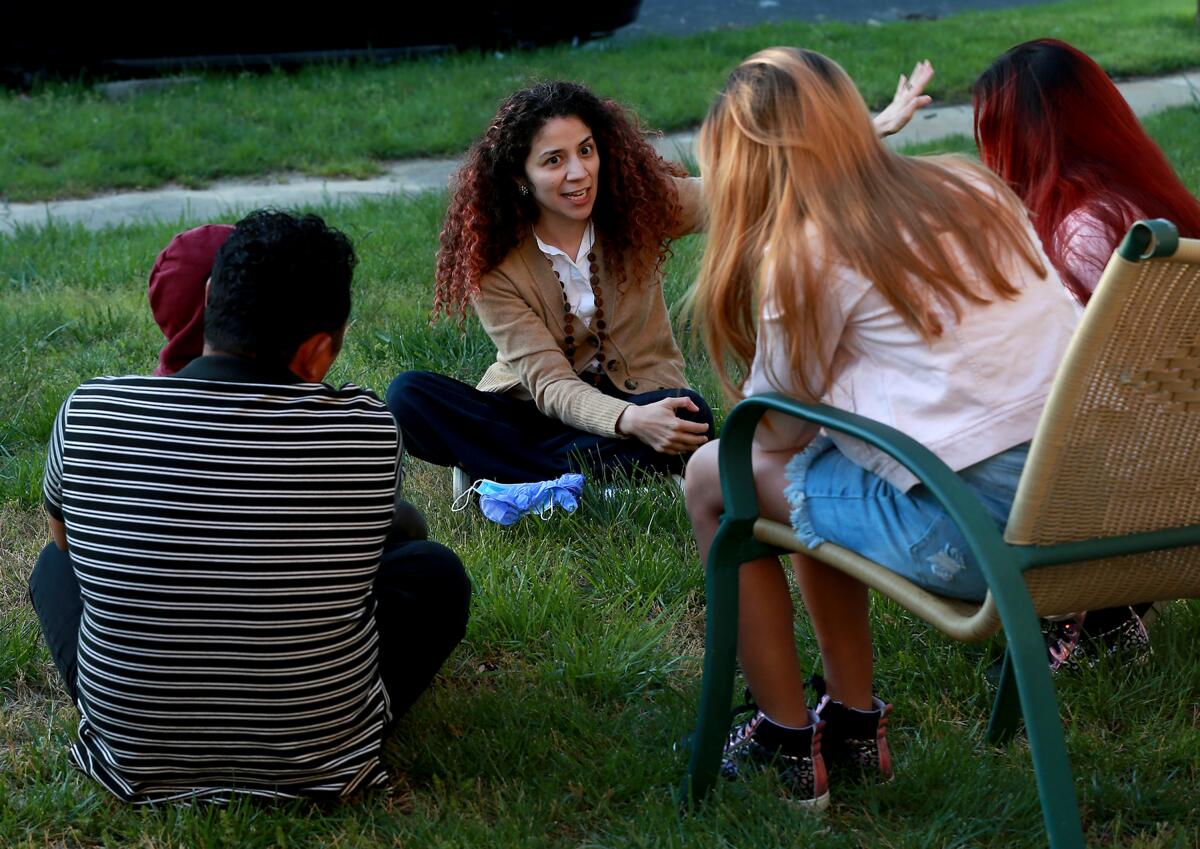
Jose’s three daughters — ages 16, 14, and 11 — are about as tall as he is. The 10-year-old boy doesn’t leave his father’s side.
In less than a year, the two oldest girls and their little brother have gone from safe-houses in El Salvador to a tent on the Rio Grande to a government shelter, and now to a home in a Washington suburb with a green lawn, a bicycle and a driveway.
Jose mostly speaks for them. He still doesn’t feel safe, even in the U.S.: MS-13, the gang in El Salvador that told his wife they’d kill the kids if she didn’t tell where he was, has offshoots in Maryland.
“There’s still this sadness in them,” Jose said of his children. “The biggest change that I’ve seen is that now that we’re here, it’s like they can breathe again.”
In El Salvador, Jose was a street preacher. The gangs ordered him to stop, but he wouldn’t. He met his wife, who also proselytized, at their evangelical church. MS-13 had killed her first husband, the two eldest girls’ biological father, in 2006.
Jose fled first, thinking the threats to the family would lessen if he were gone. He crossed the border with his youngest daughter in Laredo, Texas, just short of one year ago. The decision to come separately — they couldn’t afford to bring everyone at one time — has splintered the family in the U.S. immigration system.
Jose told U.S. officials at the border that he was afraid of persecution in El Salvador and was allowed to go to Maryland, where he has a brother and close friend.
By the time Jose’s wife and the three other kids arrived at the border about three months later, the Trump administration had imposed its Remain in Mexico policy across the entire southern border, dramatically changing the rules. Officials turned the four back to Matamoros.
In collaboration with the radio program “This American Life,” The Times takes an exclusive, front-line look at a much-criticized Trump administration policy to restrict asylum -- the Migrant Protection Protocols -- from the perspective of the asylum officers implementing it.
In January, an immigration judge in Texas denied their asylum claims. Jose’s wife believed the judge said she could not appeal without a lawyer.
In roughly four months in Matamoros, the kids had “suffered physical and sexual assault; endured illness, extreme temperatures, and malnutrition,” according to a legal filing. Ten days after the judge ruled, Jose and his wife decided she should take the children to the bridge and send them across the border on their own.
Many parents have chosen to take that chance rather than risk keeping their children in the refugee camps along the border. Of some 65,000 migrants subject to Remain in Mexico, at least 1,114 have been kidnapped, raped or assaulted in Mexico, including children, according to Human Rights First. Of asylum seekers subject to the policy, fewer than 1% have ultimately been granted relief.
On Jan. 17, the three children turned themselves in to U.S. officials at the port of entry between Matamoros and Brownsville, Texas, and were designated as unaccompanied minors, affording them special protections under the law, including a hearing before an immigration judge.
As soon as officials located Jose, he applied for custody. But the reunification stalled when the government discovered the kids had prior removal orders dating from the ruling against them and their mother in January.
Cubas and the children’s legal team sued for their release in March. The case has moved through the immigration system and federal court.
For already traumatized children, Cubas said, “it’s been an emotional roller coaster.”
In the little boy’s legal declaration — in El Salvador, the family moved so much to hide from the gangs that he never learned to read and can hardly write — he says he doesn’t really remember what happened after they crossed into the U.S. “because I’m little.”
“I miss my mom I don’t know what is happening to her,” he said. “I don’t want to return to Mexico because it is a bad place and in El Salvador the gangs are after us.”
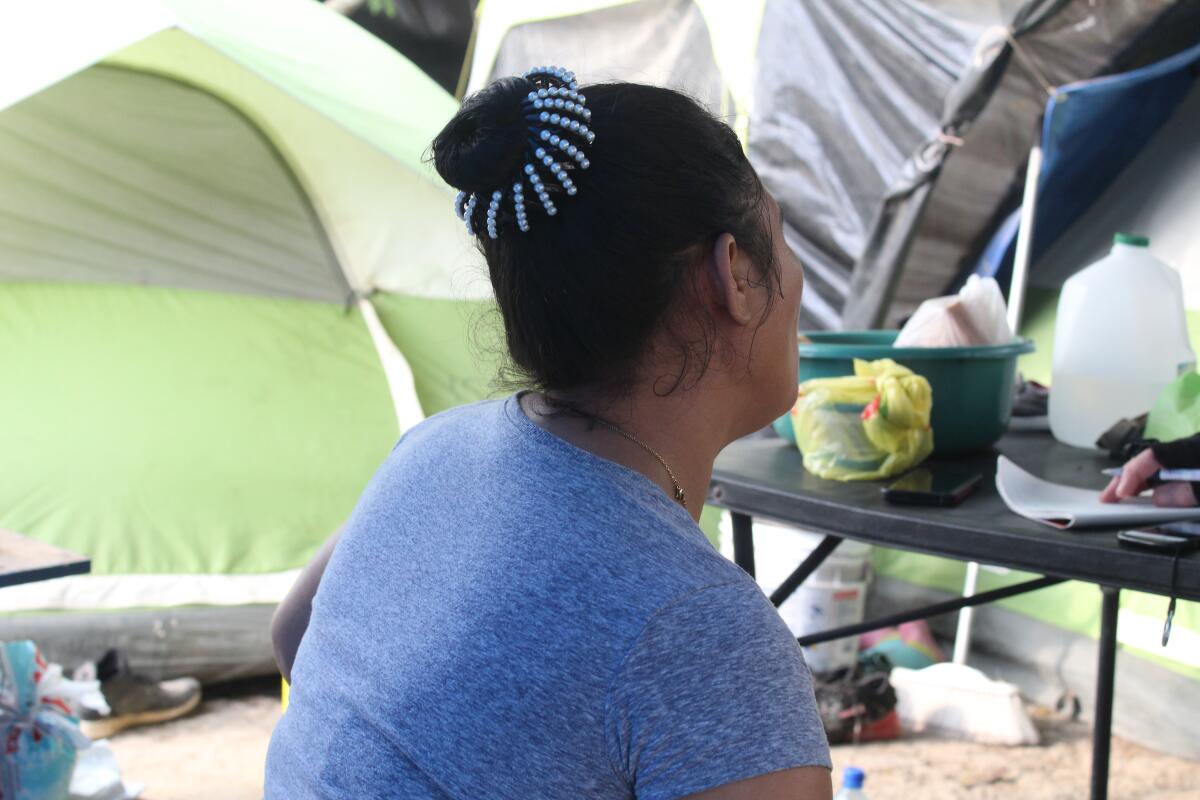
Their mother now lives alone in a blue-tarp tent in Matamoros.
“It’s just me left here,” she said in an interview last month.
The camp, which exploded in size with Remain in Mexico, has no cleaning materials or private bathrooms. Many people bathe in the muddy Rio Grande, where her three kids once saw a dead body floating. Sickness is rampant.
Public health advocates and experts have warned that a coronavirus outbreak in the migrant camps along the border would be devastating.
The mother is not so worried for her kids anymore, now that they’re in Maryland with Jose. She says she talks to them every day.
The legal battle over the children has left Jose trying to play the part of both parents amid a pandemic. He takes as many precautions as he can.
“I have to provide for them,” he said, “but then I’m exposing myself.”
He’s even more worried for his wife in Mexico. So long as they’re apart, he said, “I have this gap in my heart.”
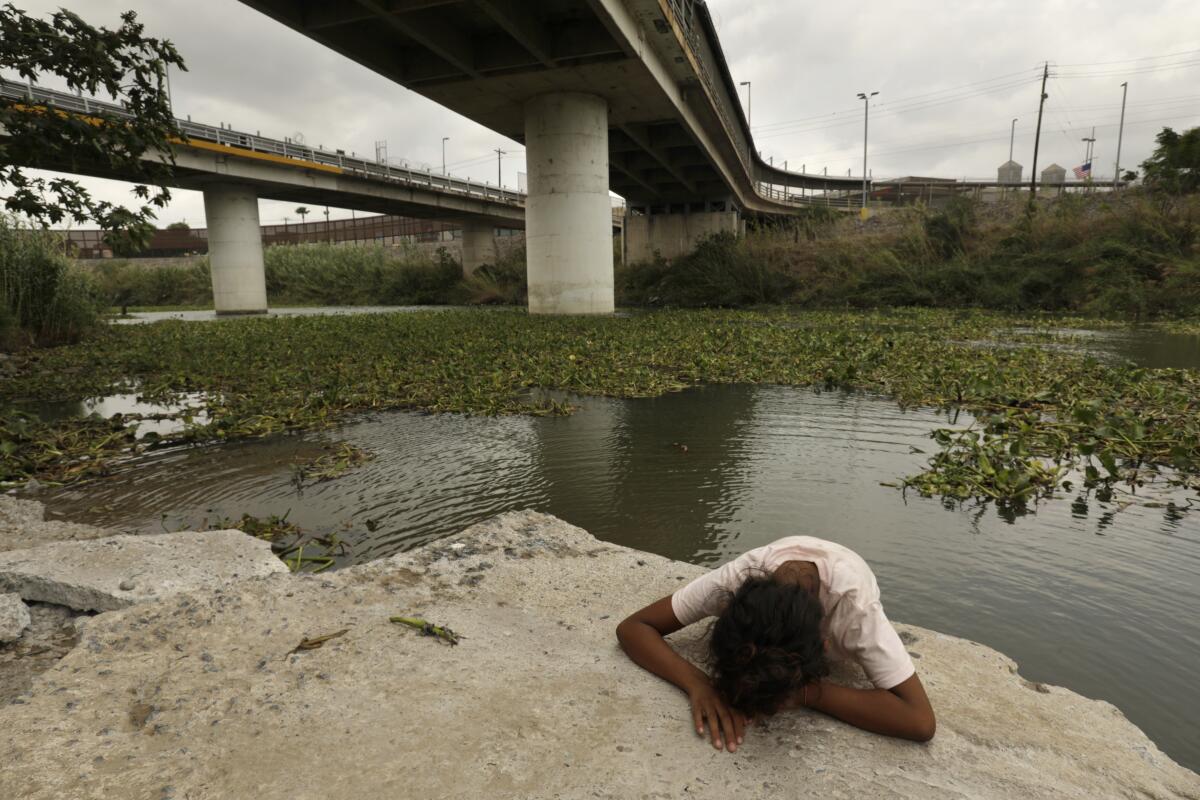
On May 8, lawyers for the government submitted a proposal for Jose’s family:
If the children agreed to “their expeditious and immediate repatriation to El Salvador” and withdrew their suits against the government, and if their mother presented herself at the border, ICE would deport them together to El Salvador, “thus, ensuring that Plaintiffs remain in the care of a parent.”
But, they warned in a footnote, should Jose’s wife try to pursue her immigration case, they could send the kids to El Salvador alone.
“To be removed with her children, Plaintiffs’ mother would have to immediately elect an expeditious reunification and joint repatriation with her children,” they wrote, “and choose to forego further action.”
They are far from the only family to be presented with such a choice; a very similar case involving two sisters, 8 and 11, unfolded recently in Texas.
The girls crossed the border by themselves after their father was mugged in Matamoros, where they’d been required to stay under the administration’s policy after seeking asylum last September. Their mother, who entered the U.S. on an existing tourist visa and is also applying for asylum, is in Houston. Thirty minutes before the girls were due to be reunited with her, ICE moved to deport them to El Salvador.
After lawyers filed suit, the girls were released to their mother. ICE has agreed not to deport them until a decision by the immigration appeals court — but they still have removal orders.
“This is another form of family separation, and it’s quite in your face,” said Elizabeth Sanchez Kennedy, immigration legal services director at YMCA International Services, who represents them.
The case of one girl’s being shuffled from hotel to hotel, alone and cut off from family and counsel, illustrates Trump’s policy of deporting migrant children.
At a hearing in early May in Jose’s family’s case, federal district Judge Randolph D. Moss said he was “troubled” by the government’s effort to “orphan” the children.
“The plaintiffs here are very young,” Moss said.
“You’re taking a nine-year-old child, removing that child from the parent and sending that child to a place in which the child has no guardian.”
With the judge questioning the constitutionality of separating Jose’s family, ICE said it would hold off on deporting the children until November or a decision by the immigration appeals court. That allows Jose time to pursue his separate asylum claim.
Getting a hearing, however, is no easy feat, with already backlogged immigration courts thrown into further chaos by the coronavirus. Already, Jose has been waiting close to a year for the Baltimore immigration court to schedule one.
Ashley Tabaddor, president of the National Assn. of Immigration Judges, noted that the administration repeatedly has pushed back Remain in Mexico hearings while insisting that unaccompanied children continue to attend court during the pandemic.
“It’s clearly more driven by law enforcement priorities than health considerations,” Tabaddor said.
Meanwhile, ICE’s stay is at the agency’s discretion; Jose’s kids still face removal orders. If he ultimately wins asylum, he likely could include his children, and potentially their mother.
In Matamoros, she said she will never allow her children to return to El Salvador.
“My wish is to be with my children there in America one day,” she said. “But if it is my turn to return, I have already lived my life. They are just beginning to live.”
Times staff writer Patrick McDonnell and special correspondent Cecilia Sánchez contributed from Matamoros and Mexico City.
More to Read
Get the L.A. Times Politics newsletter
Deeply reported insights into legislation, politics and policy from Sacramento, Washington and beyond. In your inbox twice per week.
You may occasionally receive promotional content from the Los Angeles Times.
